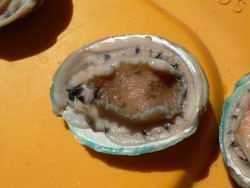Biosecurity protocols vital in abalone disease battle
by Dept Fisheries VIC on 24 Jan 2010

Diseased abalone SW
Fisheries Victoria is once again urging divers, anglers, boat operators, surfers and anyone else in the water along Victoria’s south-west coastline to observe the abalone biosecurity protocols over the summer holiday period.
Fisheries Victoria is reminding water users of the protocols to minimise the risk of spreading the disease, known as Abalone Viral Ganglioneuritis.
Abalone
Although the disease is abating in some reefs that were first affected more than three years ago, it has now been detected further to the east at Cape Otway.
Divers, fishers and boaters are encouraged to:
Wash vessels, wetsuits, dive equipment and hands with soapy freshwater
Remove all marine organic matter from vessels and equipment
Dispose of abalone shell, meat and gut within their household waste and not use abalone gut as fishing bait.
The disease poses no known or likely impacts to human health, but we are asking locals and summertime visitors to observe these protocols to help minimise the risk of spreading the disease to unaffected stretches of the coast.
The Department of Primary Industries (DPI) will continue its efforts to implement the National Abalone Health plan as primary response to the disease which includes work on epidemiology, biosecurity and stock sustainability. The plan is well underway and is backed by a $600,000 grant from the Fisheries Research and Development Corporation.
Seafood Industries Victoria is encouraging all commercial fishers to observe industry protocols and to avoid areas known to be affected by the disease.
VRFish is reminding the public that it is particularly important with the upcoming holiday period for recreational fishers and holidaymakers to observe the biosecurity protocols.
Foreshore abalone biosecurity signs will be maintained at major beach access points and expanded along the Cape Otway coast.
For more information visit www.dpi.vic.gov.au/abalonedisease to read about the abalone biosecurity protocols and watch a detailed video illustrating the recreational protocols.
Fishers and divers can also call 136 186 for a free, water-resistant abalone pocket card.
http://www.dpi.vic.gov.au/
If you want to link to this article then please use this URL: www.sail-world.com/65757